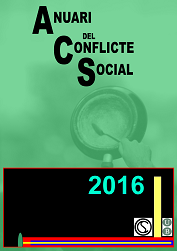NE DA(VI)MO BEOGRAD: REFERENCIA PARA EL CONFLICTO SOCIAL EN LA SOCIEDAD SERBIA
Palabras clave:
, Ne da(vi)mo Beograd, Serbia, movimiento socialResumen
Desde el derrocamiento en octubre del 2000 de Slobodan Milošević, la movilización social y crítica en Serbia fue casi inexistente. La sociedad civil quedó reducida a la actividad de las ONG. Otros actores sociales, como los sindicatos, asociaciones y movimientos sociales, no tuvieron ningún protagonismo. Incluso a partir de la crisis económica del año 2008, que afectó a toda la región a partir de 2009, se establecieron las condiciones para el conflicto social en algunas ex repúblicas yugoslavas, y, efectivamente, hubo movimientos de protesta en Eslovenia, Croacia, Bosnia-Herzegovina y Macedonia. En el caso de Serbia, tendría que llegar una nueva generación post-yugoslava y la demolición ilegal de unos edificios de la calle Hercegovačka, en Belgrado, en 2016, para que una iniciativa, el movimiento Ne da(vi)mo Beograd, cambiara los patrones de acción política en las calles serbias y abriera un nuevo período de confrontación social contra las élites, luchando contra el proyecto urbanístico Belgrade Waterfront y sus responsables políticos.
Descargas
Publicado
Cómo citar
Número
Sección
Licencia
Los/las autores que publican en esta revista están de acuerdo con los siguientes términos:
- Los autores conservan los derechos de autoría y otorgan a la revista el derecho de primera publicación de la obra, que se difundirá siguiendo la licencia de Reconocimiento de Creative Commons.
- Los/las autores son libres de establecer acuerdos contractuales adicionales independientes para la distribución no exclusiva de la versión de la obra publicada en la revista (como por ejemplo la publicación en un repositorio institucional o temático, su página web personal o un libro) , siempre que se reconozca su publicación inicial en esta revista.
- Los artículos publicados siguen la licencia de Reconocimiento de Creative Commons
- Se permite el autoarchivo de las versiones pre-print y de post-print.
Declaración de privacidad
Las direcciones de correo electrónico y los nombres introducidos en esta utilizarán exclusivamente para los fines declarados por esta revista y no se utilizarán con fines ni se pondrán a disposición de terceros.







